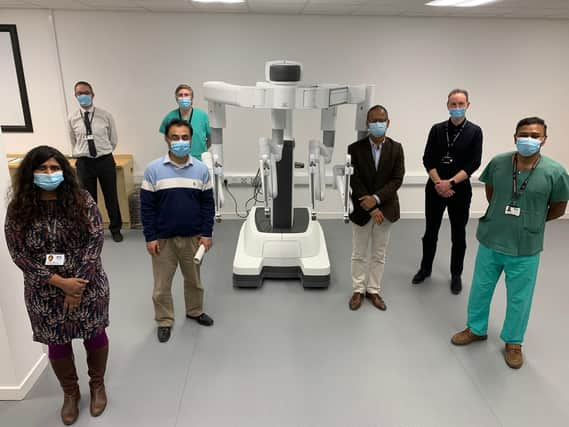Surgical robot will "transform" complex cancer surgery at Tayside hospital


The robot will assist in some surgeries for patients with cancer, especially in urology, gynaecology and ear, nose and throat procedures.
For some patients, the site of a cancer can make it difficult for surgeons to safely operate and using the surgical robot can enable a surgeon to operate on these cancers more easily.
Advertisement
Hide AdAdvertisement
Hide AdThe machine can access to hard-to-reach areas of the body by mimicking a surgeon’s hand movements, making small incisions into a patient’s body and allowing intricate procedures such as tumour and organ removal to be carried out with more precision.
Other benefits for patients of robotically assisted surgery and its minimally invasive approach include reduced hospital-stay and quicker recovery, reduced pain, reduced complications, reduced blood loss and improved patient outcomes, NHS Tayside said.
Surgeons set to use the robot will undergo intensive training in the coming months.
Jai Manickavasagam, head and neck cancer consultant and one of the surgeons who will use the robot to assist procedures, said: “Robotic assisted surgery will bring significant benefits for many patients.
“Robotic surgery, particularly if it is carried out in the head and neck areas, will transform care for those patients requiring complex surgery as it is minimally invasive and, importantly, it enhances choices of treatment for patients with head and neck cancers.”
It comes as NHS Tayside celebrated a year of new technologies introduced across the health board during the pandemic, including colon capsules, a tiny camera inside a pill which when swallowed can help detect bowel cancer.
Since a pilot of the procedure was introduced in December, 2020, 50 patients have been through it as an alternative to colonoscopy.
Another pill technology is soon to be introduced as an alternative to endoscopy.
Advertisement
Hide AdAdvertisement
Hide AdCytosponge is a small sponge on a string wrapped in a coated pill which takes samples of the lining of the gullet and can look for early signs of cancer.
Staff have undergone training and it is hoped that the Cytosponge will be in use in April.